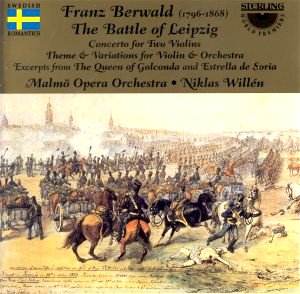Bo Hyttner of Sterling is not one for stinting on playing
time as you can see and when it comes to pushing the repertoire
envelope you will find him at the extremes. Berwald's symphonies
have a precarious claim to prominence (at least on record) but
this set ploughs largely virgin territory with no less than 15
of the 17 tracks being world premiere recordings. The two 'familiar'
pieces are the Golconda and Estrella overtures although
the other extracts (Marcia; Bröllopståg;
Baletto; Folk-Dans in the case of Golconda and
Polonäs for Estrella) are pretty much unknown.
The Battle of Leipzig has more
substance to it than Beethoven's Battle of Vitoria which
was played in Stockholm in 1818. With its fanfaring, night march
evocations and shako-and-epaulettes charges this will appeal to
those who enjoy Rossini and Weber. It is an early piece as are
the two works for violin(s) and orchestra. The Concerto is
in one movement though here tracked into three attacca-linked
segments. The music is sweetly inclined with the linkages being
to Bruch for melody and Paganini for brilliance. The Theme
and (four) Variations are founded on a gracious Italianate
melody and the piece is rounded off with a Beethovenian Poco
allegretto ending in contemplation rather than conflagration.
The Queen of Golconda music is the latest here.
The overture spiritedly wheezes and lollops along though the Malmö
strings could have done with more cream, steam and weight. The
four incidental pieces are nice, rather like Bizet meets Weber,
though hardly compulsive even if the Baletto (tr.8) would
have made a fine Beecham lollipop supplanting many a piece by
Massenet or Grétry or Chabrier. The Estrella
overture has one of those tension-pregnant introductions typical
of Weber and then pitches into a distinctly Schumann-like allegro
with some tasty work for the French horns. The Polonäs
is a nice add-on which in its wind-writing
(a strength in the Berwald symphonies) points towards Dvořák.
Lennart Hedwall's notes are a model both for
what they contain and for what they exclude. Factual material
is full; technical description is absent. Altogether a fine package
for the Berwald fan with enthusiasm and dedication aplenty from
the Malmö musicians and Willén.
Rob Barnett
